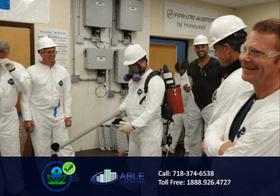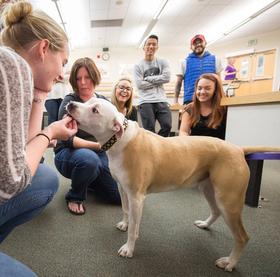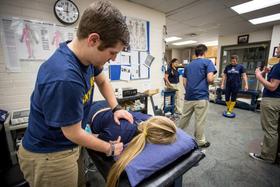As you know, healthcare is a huge industry in the United States. Since there have been significant layoffs in other sectors of the economy, whether you've been laid off or are just beginning your career, I suggest you explore healthcare. You and I think of healthcare as the domain of medical professionals such as doctors and nurses. That's only partly true. Healthcare has dozens of positions and roles, one or two of which might suit your requirements.
U.S. health care spending grew 4.1 percent in 2022, reaching $4.5 trillion or $13,493 per person. As a share of the nation's Gross Domestic Product, health spending accounted for 17.3 percent. Source: Centers for Medicare and Medicaid Services
So, to help you explore the field, I've compiled a list of some of the positions in the healthcare field, ranging from supporting roles to paraprofessional and professional roles. Healthcare offers a variety of jobs at several levels. In other words, you can earn a certificate to become a member of the profession. In fact, you don't need a four-year degree for many well-paying positions. Your community college will offer foundation courses and certifications for select positions. Contact it for more information.
We'll start with the positions requiring four or more years of education in the field.
Degreed Professionals:
Physician Assistant (PA)
Physician Assistants (PAs) work alongside physicians to diagnose illnesses, develop treatment plans, and prescribe medication. They provide essential medical care in various specialties, from primary care to surgery. From my personal experience, I believe that Physician Assistants are competent professionals.
Medical Doctor (MD)
Medical Doctors (MDs) are highly trained healthcare professionals who diagnose, treat, and manage various medical conditions. From preventive care to complex surgeries, MDs play a vital role in promoting health and well-being across different medical specialties. Most MDs have admitting privileges at a local hospital or medical center. Over the years, I have had excellent care from urologists and retina specialists. These doctors always struck me as both dedicated and highly knowledgeable.
Surgeon
Surgeons are skilled physicians specializing in surgical procedures to treat injuries, diseases, and deformities. They possess advanced surgical techniques and expertise in specific areas, such as neurosurgery, orthopedics, or cardiothoracic surgery. I've known several surgeons and always marveled at how early their work days started.
Anesthesiologist
Anesthesiologists are medical doctors specializing in anesthesia and pain management. They administer anesthesia during surgeries, monitor patients' vital signs throughout procedures, and ensure safe and pain-free experiences. I've had a couple of procedures where the anesthesiologist told me to count to 10. The next thing I remembered was waking up in the recovery room.
Retina Specialist
A retina specialist specializes in diagnosing and treating conditions affecting the retina and vitreous, such as macular degeneration. Educational qualifications: A medical degree, completion of an ophthalmology residency, and fellowship training in retina/vitreous diseases.
Urologist
Urologists specialize in diagnosing and treating disorders of the urinary tract and male reproductive system. Educational qualifications: A medical degree and completion of urology residency.
Registered Nurse (RN)
An RN provides direct patient care, administers medications, and educates patients and families. Educational qualifications: Associate's degree in Nursing (ADN) or Bachelor of Science in Nursing (BSN), passing the NCLEX-RN exam for licensure.
Pharmacist
Pharmacists are medication experts who dispense prescriptions, provide medication counseling, and ensure safe and effective medication use. They collaborate with healthcare providers to optimize drug therapy, manage chronic conditions, and promote patient health and well-being. Pharmacists work in pharmacies in stores such as Krogers and Walmart, hospitals, and other healthcare settings.
Nurse Practitioner (NP)
Nurse Practitioners (NPs) are advanced practice registered nurses. Think of them as nurses on steroids! They have specialized training in diagnosing and treating common illnesses, managing chronic conditions, and prescribing medications. They provide comprehensive primary and specialty care, emphasizing patient education, preventive care, and holistic health promotion.
Dentist
Dentists are oral health professionals who diagnose and treat dental conditions, including cavities, gum disease, and oral infections. They perform dental procedures such as cleanings, fillings, and extractions, helping patients achieve and maintain optimal oral health and beautiful smiles. Dentists earn a DDS degree, as opposed to an MD, which is what physicians earn.
Optometrist
Optometrists are eye care professionals who diagnose and treat vision problems and eye diseases. They perform eye exams and prescribe corrective lenses. They are the front line when diagnosing eye conditions, such as glaucoma, cataracts, and macular degeneration. They are not medical doctors.
Ophthalmologist
Ophthalmologists are medical doctors specializing in eye and vision care. They diagnose and treat eye diseases, perform eye surgeries, and prescribe medications to improve and maintain eye health.
Podiatrist
Podiatrists are not medical doctors. They are foot and ankle specialists who diagnose, treat, and prevent conditions affecting the lower extremities. They work with other specialists, such as orthopedic surgeons.
Chiropractor
Chiropractors are licensed healthcare professionals who specialize in spinal health and musculoskeletal disorders. They focus on holistic, drug-free approaches to restore and maintain optimal health. A chiropractor is not a medical doctor.
Dietitian/Nutritionist
Dietitians and nutritionists are experts in food and nutrition science. They specialize in promoting health and managing diseases through diet and lifestyle. They assess dietary needs, develop personalized nutrition plans, and educate individuals and groups on healthy eating habits and nutritional choices.
This video showcases the top careers of nutritionists and dieticians.
Speech-Language Pathologist (SLP)
Speech-language pathologists (SLPs) assess, diagnose, and treat communication and swallowing disorders. They work with individuals of all ages and address speech, language, voice, fluency, and swallowing challenges.
Clinical Psychologist
Clinical Psychologists specialize in assessing, diagnosing, and treating mental, emotional, and behavioral disorders. They provide psychotherapy, counseling, and psychological interventions to individuals, couples, and families, helping them manage challenges, improve coping skills, and enhance overall well-being.
Psychiatrist
Psychiatrists are medical doctors specializing in mental health and psychiatric disorders. They assess, diagnose, and treat mental illnesses using a combination of medication management, psychotherapy, and other therapeutic modalities.
Genetic Counselor
Genetic Counselors are healthcare professionals who assess and communicate genetic risks and conditions to individuals and families. They provide counseling, education, and support, helping patients make informed decisions about genetic testing, family planning, and healthcare management.
Nurse Midwife
Nurse Midwives are advanced practice nurses specializing in women's health, pregnancy, and childbirth. They provide prenatal care, attend labor and delivery, and offer postpartum support to mothers and newborns, emphasizing holistic, family-centered care and empowering women to make informed health choices.
Acupuncturist
Acupuncturists are healthcare practitioners who use acupuncture, an ancient Chinese healing technique, to promote health and alleviate pain. They insert thin needles into specific points on the body to balance energy flow, stimulate healing, and address a wide range of physical, emotional, and mental conditions.
Art Therapist
Art Therapists use creative expression and the artistic process to promote healing, self-discovery, and emotional well-being. They work with individuals, groups, and communities, using various art modalities to address mental health challenges, trauma, grief, and other emotional concerns.
Music Therapist
Music Therapists use music interventions to address physical, emotional, cognitive, and social needs. They assess individual strengths and challenges, design personalized music experiences, and facilitate therapeutic interactions to achieve therapeutic goals, such as pain management, stress reduction, and improved communication skills.
Certified Diabetes Educator
Certified Diabetes Educators (CDEs) specialize in diabetes care and education. They provide personalized diabetes self-management education and support to individuals with diabetes and their families, empowering them to make lifestyle changes, manage blood sugar levels, and prevent complications.
- 37.3 million people, or 11.3% of the U.S. population, have diabetes. An estimated 28.7 million people – had diagnosed diabetes. Approximately 8.6 million people have diabetes but have not yet been diagnosed.
- Diabetes impacts all social, economic, and ethnic backgrounds.
- 26.4 million people aged 65 years or older (48.8%) have prediabetes.
Epidemiologist
Epidemiologists are public health scientists who study the distribution and determinants of diseases in populations. They investigate outbreaks, analyze data, and identify risk factors to prevent and control diseases, informing public health policies and interventions to promote population health and safety. These people recognize and cope with diseases such as COVID-19, Ebola, and measles.
Health Policy Analyst
Health Policy Analysts research and analyze healthcare policies, regulations, and systems to assess their impact on public health and healthcare delivery. They evaluate policy options, develop recommendations, and advocate for evidence-based strategies to improve healthcare access, quality, and equity.
Biomedical Engineer
Biomedical Engineers apply engineering principles and technology to solve complex medical and healthcare challenges. They design and develop medical devices, diagnostic tools, and therapeutic solutions to improve patient care, enhance medical treatments, and advance healthcare innovation.
This video shows an alumnus of the biomedical engineering program at the Community College of Philadelphia talking about his training.
Healthcare Administrator
Healthcare Administrators oversee the business operations and management of healthcare facilities and organizations. They plan, coordinate, and direct administrative functions, such as finance, human resources, strategic planning, and quality improvement, to ensure efficient and effective delivery of healthcare services.
Certificated Paraprofessionals:
Certificated Paraprofessionals provide essential support in healthcare settings, assisting with patient care, diagnostic procedures, and health education under supervision. In other words, they support and provide the data for medical professionals to diagnose.
Certified Nursing Assistant (CNA)
Certified Nursing Assistants provide direct patient care, including bathing, feeding, and mobility assistance, ensuring comfort and well-being in healthcare settings.
Dental Hygienist
Dental Hygienists perform teeth cleanings, administer fluoride treatments, and educate patients on oral hygiene practices, promoting dental health.
Dental Assistant
Dental Assistants assist dentists during procedures, sterilize instruments, and provide chairside support to ensure smooth dental operations.
Medical Laboratory Technician (MLT)
Medical Laboratory Technicians conduct lab tests, analyze specimens, and assist in diagnosing diseases under the supervision of medical technologists or pathologists.
Phlebotomist
Phlebotomists draw blood from patients for medical tests, donations, or transfusions, ensuring accuracy and patient comfort.
This video offers an overview of the phlebotomist training at Gateway Community College in Phoenix, Arizona.
Surgical Technologist
Surgical Technologists prepare operating rooms, assist surgeons during surgeries, and maintain sterile conditions to ensure patient safety.
Medical Interpreter
Medical Interpreters facilitate communication between patients and healthcare providers who speak different languages, ensuring accurate understanding and quality care.
Health Educator
Health Educators provide health education and promote wellness through programs, workshops, and outreach activities in communities or healthcare settings.
Radiologic Technician
Radiologic Technicians operate imaging equipment to produce diagnostic images, such as X-rays or CT scans, for medical evaluation.
Massage Therapist
Massage Therapists perform massage therapy techniques to relieve muscle tension, reduce stress, and promote relaxation and overall well-being.
Questions? Contact us on Facebook. @communitycollegereview
#Healthcare #Paraprofessionals #PatientCare #CertifiedNursingAssistant #SurgicalTechnologist #MedicalLaboratoryTechnician















































































